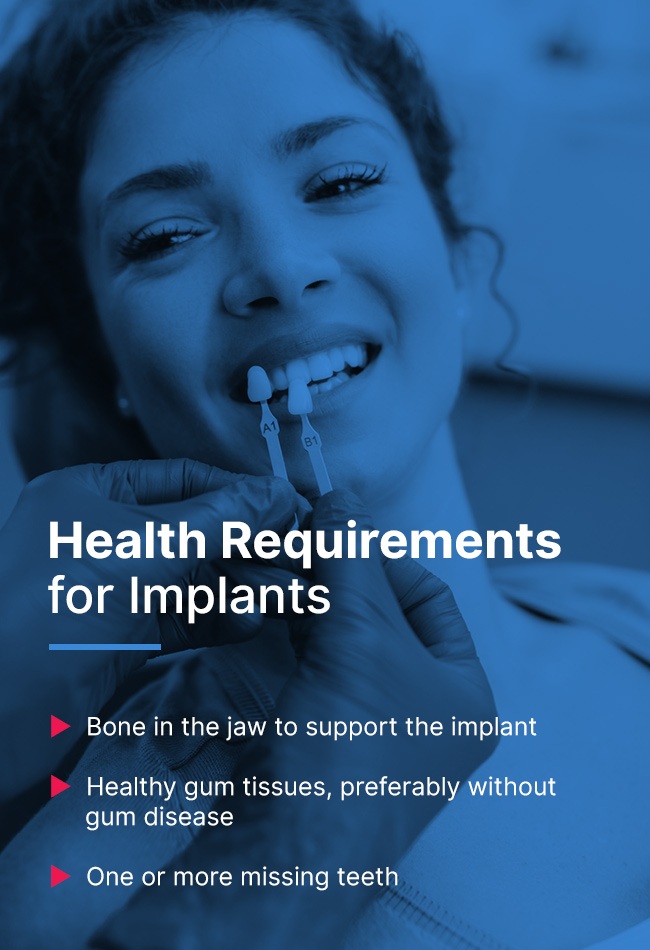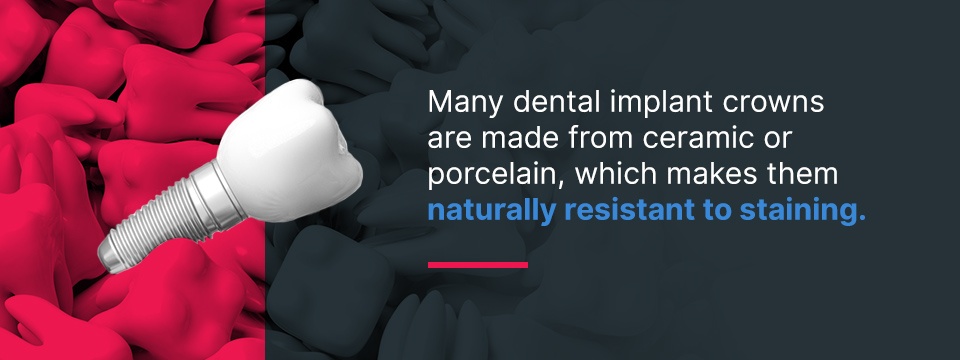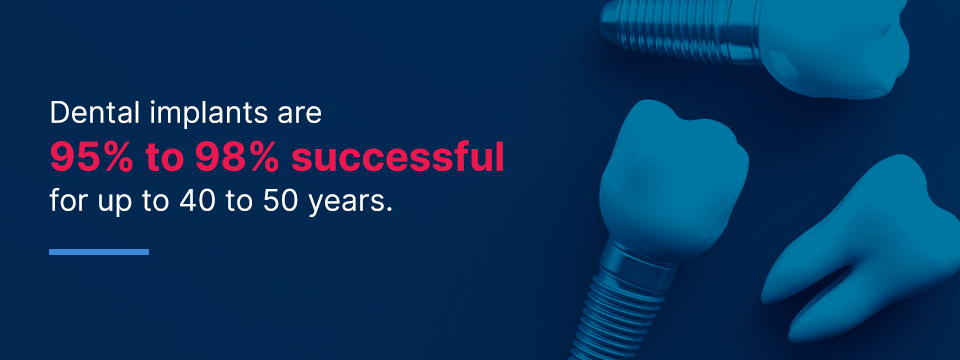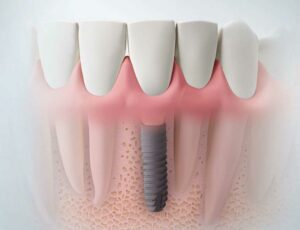Your smile helps you communicate joy and confidence to the world. When you experience tooth loss for any reason, restoring your smile back to normal is likely a high priority. Doing so with the right artificial tooth type can set you up for life-long satisfaction with your smile. But how can you decide what artificial tooth type is right for you?
Many people feel embarrassed about losing natural teeth and choose not to talk about their dental implants. For this reason, you may not feel comfortable reaching out to ask for information about implants and other artificial teeth. A lack of information about artificial teeth may perpetuate misconceptions about dental implants and leave you with more questions than answers. To help you decide if a dental implant could be right for you, let’s distinguish the facts from some common dental implant myths.
◆◆◆◆◆◆
How Common Are Dental Implants?
You want to know your artificial tooth decision is backed by the success of many before you. To do this, we can examine how popular dental implants are.
Myth: Dental Implants Are Expensive, so Few People Have Them.
When you consider upfront costs, dentures or bridges do seem like less expensive and accessible options. However, it’s important to consider how these upfront costs pan out over the long term. According to the American Academy of Implant Dentistry (AAID), long-term costs for dentures or bridges include the following:
- Replacing the dentures or bridges every five to 15 years
- Ongoing maintenance costs, including fixatives and adhesives
The longer you have your dentures or bridges, the more they will cost you financially. This calculation doesn’t include other social, convenience or health “costs.”
Fact: Many People Choose Dental Implants Each Year.
AAID reports that 3 million people in the United States have dental implants, and 500,000 people get implants each year. Though their upfront cost is higher, dental implants avoid several long-term costs that come with having dentures or bridges:
- Convenience costs: You must remove your dentures to soak and brush them, which can be a hassle.
- Health costs: Without a piece that anchors to bone, both bridges and dentures can cause your jawbone to deteriorate. Over time, this can alter your face’s shape and appearance.
- Social costs: Dentures may slip or make noise while you talk, chew, laugh or kiss. This can be embarrassing and bothersome for many.
With dental implants, your overall financial, convenience, health and social costs can be much lower.
◆◆◆◆◆◆
Is Everyone a Candidate for Dental Implants?
An important factor to help you decide on dental implants is ensuring you qualify for the procedure. Let’s take a look at the facts and myths about dental implant qualifications.
Myth: Implant Candidates Need Perfect Teeth.
To help dispel this implant myth, it is beneficial to define what dental implants are and how they function. Dental implants are titanium posts that act as artificial tooth roots. The post is implanted into a patient’s jaw — like tooth roots — and eventually, a crown is affixed to the post. Rather than perfect teeth, an implant candidate needs to have an adequate jawbone foundation.

Fact: There Are a Few Simple Health Requirements for Implants
Realistically, anyone with good general health and oral health may qualify for a dental implant. The simple requirements for an implant include the following:
- Bone in the jaw to support the implant
- Healthy gum tissues, preferably without gum disease
- One or more missing teeth
Even if your jawbone isn’t strong enough to support the implant, you can undergo a bone graft to build it back up. Dental implants may not be right for everyone, but the qualifications are far from extensive.
◆◆◆◆◆◆
Are Dental Implants Safe?
Your oral health and safety impacts much of the way you eat, talk and live. Selecting an option that keeps your safety in mind is, therefore, a significant concern.
Myth: Dental Implants Could Damage Your Gums or Jaw.
The thought of having a metal implant inserted into your gums and jaw can be frightening. On top of that, the circumstances that lead to an implant are not pleasant — whether you’ve experienced tooth decay or traumatic damage. It’s understandable to approach an implant with caution in mind. Though it may seem counterintuitive, dental implants actually protect your overall mouth health.
Fact: Dental Implants Protect Your Teeth and Mouth.
When compared to dentures or bridges, dental implants contribute to much better oral health. Dental implants protect your mouth in two ways:
- Preserving adjacent teeth: Tooth loss can cause your surrounding teeth to drift into the space left by the missing tooth. A dental implant fills this space and keeps your teeth straight and in place. Both bridges and partial dentures can damage and loosen adjacent teeth. Dental implants remove the need for hooking or cutting down adjacent teeth to keep your full smile in its best shape.
- Preserving bone: When you no longer have natural tooth roots anchored to your jawbone, that section of bone begins to deteriorate and melt away. Dental implants work as substitute tooth roots to keep your jawbone intact and preserve the structure of your face.
◆◆◆◆◆◆
Can I Get a Dental Implant Years After an Extraction?
If you’ve had an extraction, you may already use an artificial tooth solution. If that tooth solution isn’t satisfying, it’s important to understand your options moving forward.
Myth: I Cannot Get a Dental Implant Several Years Post-Extraction.
You are not immediately disqualified from getting a dental implant if your extraction was years ago. Even if you’ve been using dentures or a bridge since your extraction, you may be able to switch to an implant. The number of years since your extraction and your current artificial tooth solution are not determining factors.
Fact: You May Still Be Eligible for an Implant.
The primary factor for a dental implant is your bone health. If your bone density is still strong, the implant will have a strong foundation. If your bone density has decreased significantly since your extraction, the implant may not be able to adhere to the bone. In this case, you may still be eligible after having bone grafts. Your dentist can assess your current condition and help you figure out if a dental implant may still be an option for you.
◆◆◆◆◆◆
Do Dental Implants Feel Like Real Teeth?
You want your artificial tooth to integrate seamlessly with the rest of your smile. Accordingly, the aesthetics of a dental implant should match your goals and expectations.
Myth: Dental Implants Feel Fake and Unnatural.
The realistic nature of any artificial tooth is important. You want your artificial tooth to blend in with your teeth and look normal. Beyond that, you want it to feel normal when you chew and talk. Unlike dentures or bridges, dental implants go a long way to function like natural teeth.
Fact: Dental Implants Look and Feel Realistic.
Dental implants achieve their natural look and feel in a variety of ways:
- Appearance: The tooth-shaped part of a dental implant — known as a crown — is made from ceramic or porcelain. These crowns are designed to imitate your existing teeth in their shape, color and appearance.
- Facial Structure: Because dental implants prevent your jawbone from deteriorating, they keep your smile and facial structure as natural as possible.
- Utility: Dental implants function much like natural teeth. They also don’t slip or make noise like dentures or bridges.
Compared to bridges and dentures, dental implants provide one of the most realistic experiences available.
◆◆◆◆◆◆
Do Dental Implants Stain?
Your natural teeth are subject to discoloration and staining over time. How does a dental implant hold up against these same factors?
Myth: Dental Implants May Change Color and Not Match Other Teeth.
When the crown part of your dental implant is made, it matches your natural teeth. Your natural teeth may experience staining from some of these factors:
- Food and drink like coffee, tea, soda, wine and certain fruits or vegetables
- Tobacco use
- Poor dental hygiene
- Certain diseases or health conditions
- Certain medications
- Old age
- Genetics
- Excessive fluoride
- Trauma
Fortunately, dental implant crowns do not react like your natural teeth.
Fact: Many Dental Implants Are Stain Resistant.
Many dental implant crowns are made from ceramic or porcelain, which makes them naturally resistant to staining. Coloration issues may arise when the crown’s glaze is broken. Disrupting the glaze with abrasive items may put you at risk for discoloration. In general, it’s best to follow a healthy oral care routine and adhere to your dentist’s recommendations to keep your dental implants safe.

◆◆◆◆◆◆
Do Dental Implants Stay White?
An artificial tooth solution should contribute to maintaining a pearly white smile. Let’s take a look at the ways dental implants hold their color.
Myth: Dental Implants Always Yellow With Age.
Because dental implants function similarly to natural teeth, you may assume they will yellow over time. Your natural teeth yellow for a variety of reasons. Even after whitening treatments, your natural teeth gradually return to a somewhat yellow shade. Dental implant crowns behave differently than natural teeth in this area.
Fact: Dental Implants Remain White if Properly Cared For.
Dental implants are less susceptible to color change in general. Your dentist will match the color to your existing teeth, and the implant should remain that color with proper care and maintenance. As always, following your doctor’s recommendations will yield the best results.
◆◆◆◆◆◆
Are Dental Implants Painful?
Your life doesn’t stop when you experience tooth loss. Understanding the type of recovery and discomfort associated with a dental implant can help you gauge what kind of commitment this method will take.
Myth: Getting Dental Implants Will Be Painful and Bothersome.
Most surgeries provide valuable assistance and repair to help your body function well. However helpful the outcome, surgery isn’t exactly fun. It’s natural to question the amount of pain you’ll experience after dental implant surgery. While oral surgery does require some recovery, it may not be as severe as you suspect.
Fact: Dental Implant Procedures and Usage Are Less Painful Than You Think.
Many individuals with dental implants say the procedure was less painful than they anticipated. In fact, many equate the pain to less than that of tooth extraction. Once you have recovered and begin to use the implants, you’ll experience less pain than you might with dentures.
◆◆◆◆◆◆
Do They Put You To Sleep for Dental Implants?
Surgery can be an intimidating process. When you choose dental implants, you want to know what kind of options will be available during the procedure to keep you relaxed.
Myth: I Will Be Uncomfortable and in Pain During the Implant Procedure.
Though oral surgery can be a scary process, there are several options for pain management during the implant procedure.
Fact: There Are Several Pain Management Options for the Dental Implant Procedure.
According to the Mayo Clinic, you may be able to choose from local anesthesia, sedation or general anesthesia for your procedure. Your pain management method may differ based on your specific procedure, your experience with oral surgery and your anxiety about the process. Regardless, you can rest assured that there will be an option that fits your needs.
◆◆◆◆◆◆
Do Dental Implants Last Forever?
When you’re choosing an artificial tooth method, the best option is one you don’t need to worry about. Let’s take a look at the kind of longevity and peace of mind a dental implant offers.
Myth: Dental Implants Are Only Good For 10 Years.
A 10-year lifespan actually aligns with bridges, not dental implants. This 10-year lifespan typically results from a weakened tooth structure for the bridge’s support. Removable partial dentures do not fare any better. According to the Institute for Dental Implant Awareness (IDIA), removable partial dentures last for three to five years and need to be relined to adjust for bone deterioration. Comparatively, dental implants last much longer.
Fact: Dental Implants Are Designed to Last a Lifetime.
The fact about dental implants is that they are made to last a lifetime. Studies have shown dental implants to be 95% to 98% successful for up to 40 to 50 years. And unlike bridges, the success rate for dental implants does not decrease over time. When you choose dental implants, you can be confident they will provide a long-lasting solution.

◆◆◆◆◆◆
Can Dental Implants Be Rejected by the Body?
The fear of failure can be immense when considering surgery. You want to know that your investment and sacrifice will bear worthwhile returns.
Myth: Half of All Dental Implants Are Rejected.
Like many myths that necessitate the sharing of facts about dental implants, this statement is rooted in a misunderstanding of the implant process. When a dental implant is placed, your jawbone goes through a process known as osseointegration. During osseointegration, the implant and your jawbone grow together to form a long-lasting foundation for your new tooth. This process can take several months. But what if your jawbone doesn’t grow around the implant?
Fact: Dental Implants Are Rarely Rejected
Fortunately, this doesn’t happen very often. Most dental implants integrate with a patient’s jaw to create a solid tooth foundation. On the rare occasions where osseointegration doesn’t occur, the implant can be removed and you can try the procedure again in three months.
◆◆◆◆◆◆
Do Dental Implants Work As Well As Dentures?
The quintessential question for any artificial tooth type is simple. Does it work? Let’s take a look at how dental implants hold up against common alternatives like dentures.
Myth: Dentures Are Always a Better Option Than Dental Implants.
At first glance, dentures may have a few benefits. Dentures do offer an inexpensive initial cost. And if you don’t have any natural teeth left, getting dentures won’t require surgery. However, when it comes to functionality, dental implants make a better option than dentures.
Fact: Dental Implants Perform Better Than Dentures With Less Hassle.
Overall, dental implants function like a normal tooth. Dental implants can help you avoid the discomfort that comes with poor-fitting dentures. You won’t have to replace your dental implant, and the implant won’t affect the way you talk, eat and live. On top of all of this, dental implants protect your jaw from deterioration that could permanently change the appearance of your smile.
If you’re looking for a convenient, high-quality and high-performance tooth replacement option, dental implants top the list in all three categories.
◆◆◆◆◆◆
Find a High-Quality Dental Solution With Hiossen® Implant
Exposing dental implant myths is just one step toward making the important decision of selecting an artificial tooth. The truth about dental implants speaks volumes. To amplify your dental implant benefits, choose a high-quality product from Hiossen Implant. We provide exceptionally crafted dental implants, but we care about more than developing products that work. We focus on refining implants that shorten your treatment period, enhance your convenience and maximize your aesthetic outcome.
Choosing a dental implant is a big decision. For a state of the art product that can transform your smile, trust Hiossen Implant. For more information about how we can help you, contact us today.




